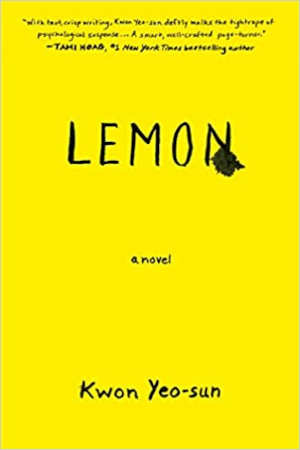Kwon Yeo-sun Lemon recensie en informatie over de Koreaanse misdaadroman. Op 26 oktober 2021 verschijnt bij Uitgeverij Other Press de nieuwe roman van de Koreaanse schrijfster Kwon Yeo-sun. Er is nog geen Nederlandse vertaling van roman verschenen of aangekondigd.
Kwon Yeo-sun Lemon recensie en informatie
Als de redactie het boek leest, kun je op deze pagina de recensie en waardering vinden van de roman Lemon. Het boek is geschreven door Kwon Yeo-sun. Daarnaast zijn hier gegevens van de uitgave en bestelmogelijkheden opgenomen. Bovendien kun je op deze pagina informatie lezen over de inhoud van nieuwe roman van de Koreaanse schrijfster Kwon Yeo-sun.
Lemon
- Schrijfster: Kwon Yeo-sun (Zuid-Korea)
- Soort boek: Koreaanse misdaadroman
- Engelse vertaling: Janet Hong
- Uitgever: Other Press
- Verschijnt: 26 oktober 2021
- Omvang: 160 pagina’s
- Uitgave: gebonden boek / ebook
Recensie en waardering van de roman
- “A striking teenage girl is found dead…The victim’s sister, Da-On, still obsessed with the murder [years later], revisits some of its principal figures in unnerving, elliptical chapters.” (New York Times)
- “Kwon’s brief, fierce novel takes daring leaps through time…A chilling examination of the repercussions of violence.” (Kirkus Reviews)
- “A haunting literary crime story…Razor-sharp observations of class, gender, and privilege in contemporary Korea…[a] page-turner.” (Cosmopolitan)
Flaptekst van de roman van Kwon Yeo-sun
Lemon, new novel by Kwon Yeo-sun, plays with you. It makes you believe it is one thing when in fact it is another. Of course there is a murder mystery—this is the idea and the pitch—and exactly as in the amazing movie Parasite, the question of class is front and center. Love is a player, but not the most believable one. I would say envy or jealousy are the key characters, but you don’t catch on to this right away: every page you turn, something is pulled out from under your feet. To me Lemon is akin to critical theory: it reveals a world that holds together through remnants of an ancient culture that hasn’t entirely been eaten by capitalism. Tradition, grace, and politeness inform ways that people relate to each other, trying to keep afloat something genuine about family connections, friendship, and respect. But there is a poison that filters in nevertheless.
Something very interesting is happening here: There is a strategy at work in this novel that gives us access to truths that we usually try to dismiss in our daily lives—things we may say to ourselves but not to others. This is because Kwon acutely describes emotions without ever calling upon a metaphor to create a particular poetic or interpretative effect. This is what makes this novel so intriguing. It exposes how metaphors help us to hide things while appearing to make them look more profound. Here the writing is what it is. It reveals that if there is a mystery to solve, you won’t need literary tropes that attempt to give it depth or complexity—you can go straight to the most basic human emotions.

